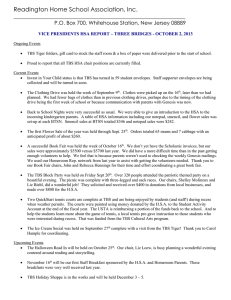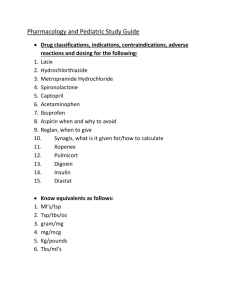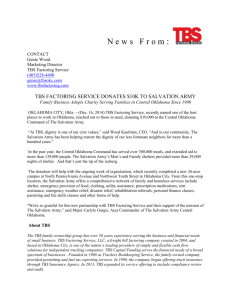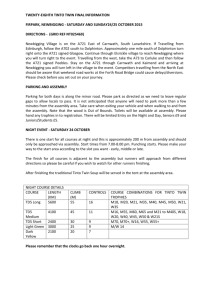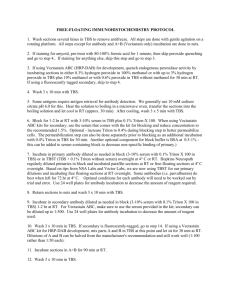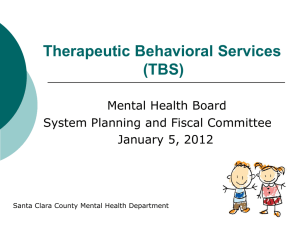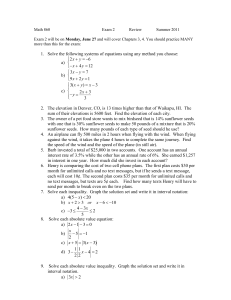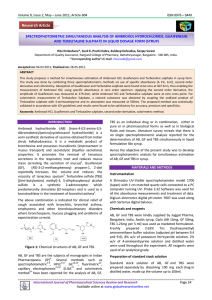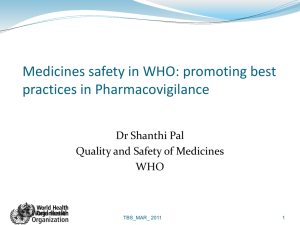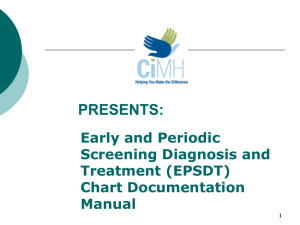PowerPoint *********
advertisement
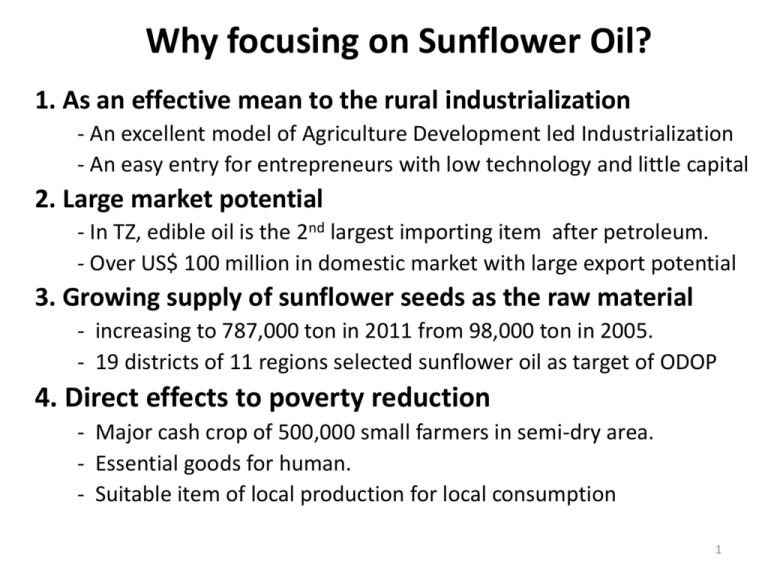
Why focusing on Sunflower Oil? 1. As an effective mean to the rural industrialization - An excellent model of Agriculture Development led Industrialization - An easy entry for entrepreneurs with low technology and little capital 2. Large market potential - In TZ, edible oil is the 2nd largest importing item after petroleum. - Over US$ 100 million in domestic market with large export potential 3. Growing supply of sunflower seeds as the raw material - increasing to 787,000 ton in 2011 from 98,000 ton in 2005. - 19 districts of 11 regions selected sunflower oil as target of ODOP 4. Direct effects to poverty reduction - Major cash crop of 500,000 small farmers in semi-dry area. - Essential goods for human. - Suitable item of local production for local consumption 1 Agriculture Development Led Industrialization Growing Production of Sunflower Seeds 1000 ton Source : 2003-07 MAFS 2008-11 The Economic Survey Contract Farming Entry of Entrepr eneurs 2003 2004 2005 2006 2007 2008 2009 2010 2011 800 700 600 500 400 300 200 100 0 Positive Linkage from Seed Production to Industrialization Increase of Seed Production 19 districts of 11 Regions adopt sunflower as ODOP Arusha, Dodoma, Iringa, Kagera, Kilimanjaro, Manyara, Rukuwa, Shinyanga, Singida and Tabora 2 Overview Scene Recovering edible oil market from imported palm oil. Structure One large oil mill and 1000 newly born small-scale processors. Crude Oil Good for human consumption if consumed immediately after extraction. Required to be refined to avoid oxidization for long life. TBS Standard TBS maintains two standards as temporal measures (TZS 50:2010) - - Crude sunflower oil for immediate consumption - Refined sunflower oil for long-life consumption Current Stage Crude oil has fulfilled village demand and now needs distant markets with refined quality. 3 Positive & Negative Chain of Agriculture and Industry Improvement of yields through promotion of quality seeds and fertilizer Short Supply Increase of Entry of Shut Down Supply entrepreneurs in Over Supply 3 bags oil processing Biz. 12-15 bags/acre Stop Prod’n Price Crash Needs of Collaborations Demand Supply of Agriinput and tractor tilling through contract farming Formation of cluster & Association Construction of oil refinery 4 Challenges 1. Operating at improper business premises - Majority of processors don’t have proper premises. - Environmental issues + little space for expansion. 2. Poor quality of products - Very few enterprises fulfill TBS standard. 3. No refining capacity - Crude oil is good for human consumption if consumed immediately after the extraction. - Need to be refined if marketed to distant markets 4. Little credibility and finance access - Little working capital to maintain seed market when bump harvest. - Little capital for expansion and up-grading the facilities. 5. Dependency on Chinese/Indian made machineries. - Frequent machine trouble without maintenance support 5 Challenges of Local Machinery Industry Chinese made processor has low quality iron gear for power transmission. Locally made processor adopts easy maintenance application but expensive due to non-mass production. Mini Oil Refinery with capacity of 500 litter per hour developed by SIDO Iringa. Budget price at TZS 55 million. Needs cluster formation to upgrade the oil for distant markets. 6 Proposed Intervention • Providing industrial spaces at regions. => Micro Manufacturing Enterprises(MME) Parks at every region => Cluster development with oil refining unit at the core. • Fostering local agro-machinery industry => Commercialization of SIDO mini refinery => Mass production of local made processors • Improvement of management and quality =>TBS quality up-grading campaign KAIZEN for quality and management improvement UNIDO up-grading operation for 5 model firms. • Financial Support Programs => Warehouse Receipt System launched => SIDO Credit Guarantee system planned 7 Joint campaign of SIDO, TBS and TFDA Increase qualified suppliers by notify SMEs the eligibility requirement of TBS/TFDA standard and promote remote registration through SIDO. To provide - A check-list of facility requirements to pass TFDA inspection - A check-list of quality requirements to pass TBS standard - A leaflet of remote application for TBS certificate through SIDO offices. To hold workshop at - Northern circuit (Dodoma, Singida, Babati, Moshi) in Nov. 2012 - Southern circuit (Morogoro, Iringa, Makambako and Mbeya) in Dec. 2012 To target - 100 TBS Certificates by June 2013 - 300 TBS Certificates by June 2014 8
